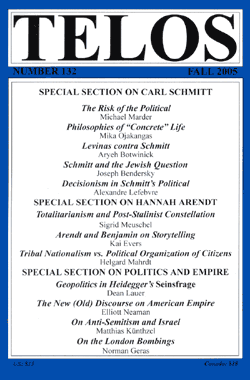By Simas Čelutka · Tuesday, February 23, 2016 In his essay “Carl Schmitt on Friends, Enemies and the Political,” Andrew Norris inquires into the question that I have been interested in for quite some time: political friendship in Carl Schmitt’s political philosophy. Schmitt’s interpreters usually focus on the issue of enmity in his concept of the political, not least because Schmitt himself elaborates on the existential significance of political enmity much more extensively. From a conceptual point of view, however, political friendship should be viewed as at least equally relevant a part of Schmitt’s account of the political. The specific criterion of the political is famously the distinction “between friend and enemy,” not simply an indefatigable presence of political enmity. Norris should be lauded for his attempt to foreground a crucial, though still insufficiently explored, notion of a political (public) friend in Schmitt’s Concept of the Political.
Continue reading →
By Simas Čelutka · Wednesday, January 27, 2016  Today’s world is witnessing a noticeable intensification of hostilities and confrontations on many fronts of international relations. A revisionist and neo-imperialist Russia, annexing Crimea and staging a cynical proxy war in Eastern Ukraine in 2014, is challenging the very foundations of the post–Cold War international order. The Syrian “quagmire,” which began in 2011, created a space for the emergence and gradual establishment of the so-called Islamic State (ISIS), now widely recognized as the paramount terrorist organization threatening the security architecture in the Middle East as well as Europe. Terrorist attacks in France, Egypt, Mali, Tunisia, Lebanon, and other countries have been widely and justifiably interpreted as warnings signaling that Europe (or the West in general) is unable to cope with its new enemies. The chaos and uncertainty that ensued after the flood of refugees and migrants into Europe only exacerbated the perception of weakness and unwillingness on the part of the Western leaders to tackle these challenges seriously. In this alarming context, political philosophy once again gains significance as an existential occupation. This is the reason why a re-evaluation of the controversial oeuvre of Carl Schmitt, the thinker who articulated some of the most acute criticisms of modern liberalism, is so timely. Today’s world is witnessing a noticeable intensification of hostilities and confrontations on many fronts of international relations. A revisionist and neo-imperialist Russia, annexing Crimea and staging a cynical proxy war in Eastern Ukraine in 2014, is challenging the very foundations of the post–Cold War international order. The Syrian “quagmire,” which began in 2011, created a space for the emergence and gradual establishment of the so-called Islamic State (ISIS), now widely recognized as the paramount terrorist organization threatening the security architecture in the Middle East as well as Europe. Terrorist attacks in France, Egypt, Mali, Tunisia, Lebanon, and other countries have been widely and justifiably interpreted as warnings signaling that Europe (or the West in general) is unable to cope with its new enemies. The chaos and uncertainty that ensued after the flood of refugees and migrants into Europe only exacerbated the perception of weakness and unwillingness on the part of the Western leaders to tackle these challenges seriously. In this alarming context, political philosophy once again gains significance as an existential occupation. This is the reason why a re-evaluation of the controversial oeuvre of Carl Schmitt, the thinker who articulated some of the most acute criticisms of modern liberalism, is so timely.
Continue reading →
|
|
 Today’s world is witnessing a noticeable intensification of hostilities and confrontations on many fronts of international relations. A revisionist and neo-imperialist Russia, annexing Crimea and staging a cynical proxy war in Eastern Ukraine in 2014, is challenging the very foundations of the post–Cold War international order. The Syrian “quagmire,” which began in 2011, created a space for the emergence and gradual establishment of the so-called Islamic State (ISIS), now widely recognized as the paramount terrorist organization threatening the security architecture in the Middle East as well as Europe. Terrorist attacks in France, Egypt, Mali, Tunisia, Lebanon, and other countries have been widely and justifiably interpreted as warnings signaling that Europe (or the West in general) is unable to cope with its new enemies. The chaos and uncertainty that ensued after the flood of refugees and migrants into Europe only exacerbated the perception of weakness and unwillingness on the part of the Western leaders to tackle these challenges seriously. In this alarming context, political philosophy once again gains significance as an existential occupation. This is the reason why a re-evaluation of the controversial oeuvre of Carl Schmitt, the thinker who articulated some of the most acute criticisms of modern liberalism, is so timely.
Today’s world is witnessing a noticeable intensification of hostilities and confrontations on many fronts of international relations. A revisionist and neo-imperialist Russia, annexing Crimea and staging a cynical proxy war in Eastern Ukraine in 2014, is challenging the very foundations of the post–Cold War international order. The Syrian “quagmire,” which began in 2011, created a space for the emergence and gradual establishment of the so-called Islamic State (ISIS), now widely recognized as the paramount terrorist organization threatening the security architecture in the Middle East as well as Europe. Terrorist attacks in France, Egypt, Mali, Tunisia, Lebanon, and other countries have been widely and justifiably interpreted as warnings signaling that Europe (or the West in general) is unable to cope with its new enemies. The chaos and uncertainty that ensued after the flood of refugees and migrants into Europe only exacerbated the perception of weakness and unwillingness on the part of the Western leaders to tackle these challenges seriously. In this alarming context, political philosophy once again gains significance as an existential occupation. This is the reason why a re-evaluation of the controversial oeuvre of Carl Schmitt, the thinker who articulated some of the most acute criticisms of modern liberalism, is so timely. 






